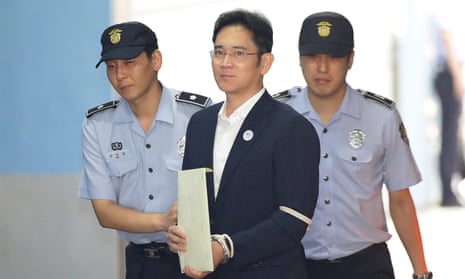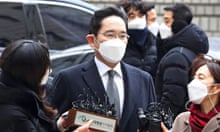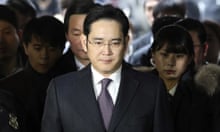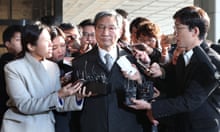A bribery and cronyism scandal that has already toppled a South Korean president has claimed a major business scalp after a court sentenced Lee Jae-yong, the acting chairman of Samsung, to five years in prison for crimes including offering bribes and perjury.
The billionaire, South Korea’s third-richest man and heir to the sprawling Samsung empire, had been accused of making large donations to foundations run by a close friend and confidante of the deposed South Korean president, Park Geun-hye, in return for political favours.
The court said Lee provided bribes anticipating support from Park, who was still president at the time, according to South Korea’s Yonhap news agency.
Lee’s lawyers said they would appeal. “As a lawyer I cannot possibly agree with the juridical decisions and acknowledged facts involved in the verdict,” the Samsung attorney Song Woo-cheo said outside the court.
“We will appeal against the decision and I am sure that in the appellate trial all the charges will be dismissed.”
Lee’s case could end up being decided by the country’s supreme court, possibly next year.
Lee showed no reaction as the court found him guilty of bribery, embezzlement, hiding assets overseas, concealing profit from criminal acts and perjury.
Earlier, South Korean TV followed him on his journey from a detention centre to the court. He emerged from a justice ministry bus in handcuffs, with white rope around his jacket, and carrying an envelope of documents.
There was huge public pressure on the court to deliver a guilty verdict after the wide-ranging scandal swirling around Park ended in her impeachment last year and calls for South Korea to address decades of collusive ties between senior politicians and family-run conglomerates, or chaebol.
While the 49-year-old, who is also known as Jay Y Lee, was spared the 12-year term demanded by prosecutors, his sentence is the longest given to any South Korean chaebol leader.
Four other top Samsung executives were also convicted and received sentences of up to four years.
Lee’s conviction could also have consequences for Park, given that their cases are so closely linked. Park faces a possible life sentence when a ruling in her case is given later this year.
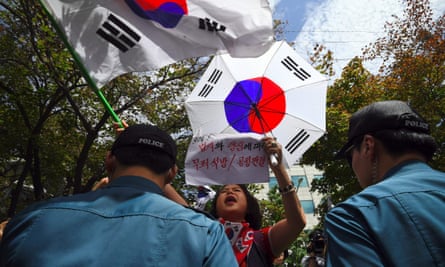
More than 400 people applied for the 30 seats in the public gallery to witness what South Korean media billed as the “trial of the century”.
Outside, hundreds of riot police were deployed to prevent confrontations between critics and supporters of Lee and Park, a former dictator’s daughter who was elected South Korean’s first female president in late 2012 and took office in February 2013.
Despite claims by his legal team that Lee had little involvement in the day-to-day running of Samsung, the court ruled that he had approved donations to Park’s friend, Choi Soon-sil, in return for securing government support for the contentious merger of two Samsung affiliates that would strengthen his control over the group.
Q&AWhat are chaebol and why are they controversial?
Show
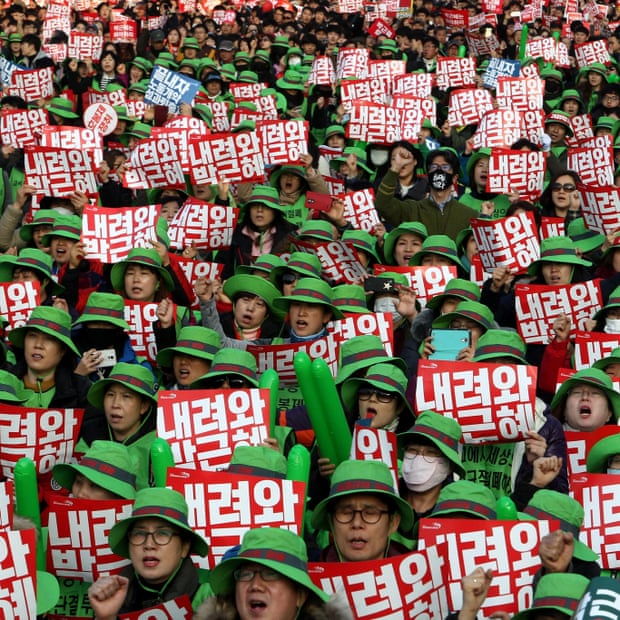
Chaebol businesses are the massive, family-run conglomerates that dominate South Korea's economy and enjoy close links to the country's political elite.
They emerged when South Korean businessmen took over the assets of colonial-era Japanese firms after the second world war, and rose to prominence under the industrial policies of President Park Chung-hee in the 1960s.
The chaebol are controversial because many South Koreans view them as exemplifying too cosy a relationship between business and government.
The relationship was largely tolerated while the chaebol spearheaded rapid economic growth, but a rising income gap, youth unemployment and high-profile cronyism scandals including that which brought down former president Park Geun-hye have fuelled public anger. Moon Jae-in, elected to replace Park, ran on a platform of reforming the chaebol.
Since his arrest in February, Lee has insisted the payments were made to Samsung without his knowledge, and with no expectation of favours from the Park administration.
Lee, the scion of South Korea’s richest family and its biggest company, had been accused of offering $38m (£30m) in bribes to four entities controlled by Choi, to whom Park often turned for advice and allegedly gave access to government documents even though she did not have security clearance.
Choi is alleged to have set up the foundations to support Park’s policies. Samsung has not denied donating money to the foundations, but said it was forced to do so by Park.
Samsung was also accused of separately giving Choi billions of won to fund her daughter’s equestrian career in Germany. In return, Lee allegedly sought government approval for the $8bn merger of two Samsung affiliates in 2015 – a move that would cement his control of the Samsung group. The merger was opposed by many shareholders, but went through after it was approved by the national pension fund, a major Samsung shareholder.
The case has at the very least put on hold Lee’s attempts to exert total control over the Samsung group, of which he has been the de facto head since his father suffered a heart attack in 2014.
Investors are concerned that his enforced absence will create a leadership vacuum at Samsung – which has dozens of affiliates and assets of $322bn (£250bn) – and harm its ability to make key strategic decisions.
Samsung has not publicly reacted to Friday’s ruling, but employees at the firm were reportedly “dumbfounded” and concerned for its future.
“We were taken aback when he was arrested in February,” one Samsung insider told Yonhap. “But his conviction has come as a bigger shock. The company has been in emergency mode due to the leadership vacuum. And Lee’s conviction means the emergency situation will continue for a long time.”
Other business figures to have stood trial in South Korea have traditionally received light sentences, fueling criticism that chaebol leaders are treated with unwarranted leniency by the courts.
They included Lee’s father, Lee Kun-hee, who was convicted of tax evasion in 2009 and had a three-year sentence suspended, with judges citing his contribution to South Korea’s economic success and his “patriotism through business enterprise from job creation”. He was pardoned four months after the final ruling.
Park Sangin, a professor of economics at Seoul National University, said shortly before the verdict: “Chaebol leaders used to get the same sentencing every time. There was even a saying called the ‘3-5 law’ – three years sentencing, five years’ probation.
“If Lee receives a heavy sentence, it can be seen as the shattering of the ‘too-big-to-jail’ trend of the past.”
South Korea’s new president, Moon Jae-in, won a landslide victory in May pledging to rein in the chaebol and clamp down on white-collar crime involving corporate tycoons.
